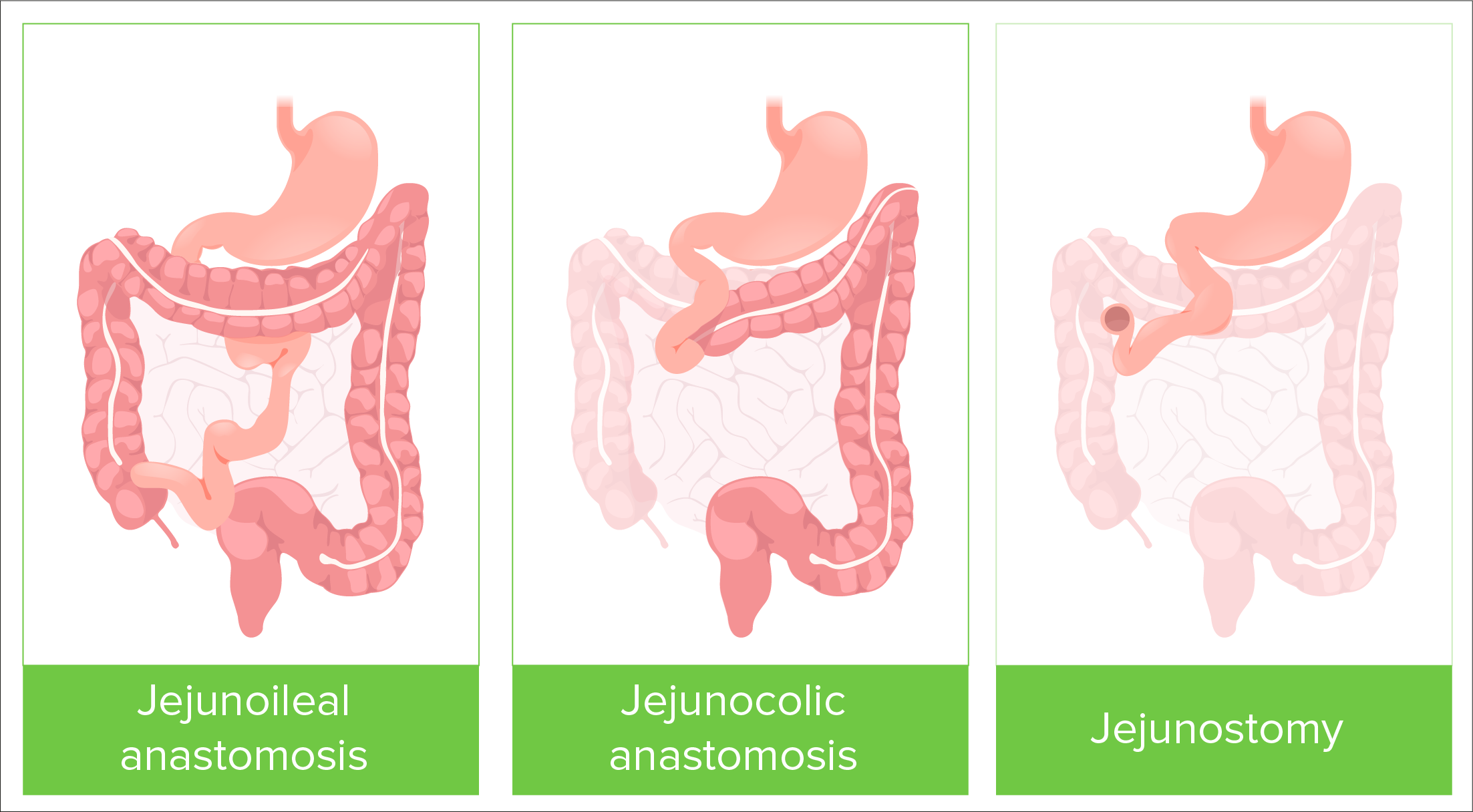Playlist
Show Playlist
Hide Playlist
Short Bowel Syndrome with Case
-
Slides Gastroenterology 07 Small Intestine Disorders.pdf
-
Reference List Gastroenterology.pdf
-
Download Lecture Overview
00:00 So now let's move on to our next case. 00:03 We have a 43-year-old woman, seen in clinic for a 6-month history of diarrhea. 00:08 She has a history of Crohn's disease for which she underwent small bowel resection a year ago. 00:14 Her diarrhea is non-bloody and occurs anywhere from 3 to 5 times a day. 00:19 She notes it often happens immediately after meals. 00:22 She has also lost 8 kilograms in the last year. 00:26 Vitals are notable for heart rate of 95 and her physical exam is notable for mild diffuse muscle wasting. 00:33 So what is the most likely diagnosis? So she has a history of both Crohn's disease and small bowel resection which may cause chronic diarrhea. 00:45 She does have non-bloody diarrhea that is worsened by eating and weight loss which is concerning for malabsorption. 00:54 Her physical exam also confirms that she has some signs of malabsorption with her tachycardia and her muscle wasting. 01:04 So at this point, I'll refer you back to the approach to the patient with diarrhea for more in-depth look at conditions of the small bowel that can cause diarrhea. 01:13 But we'll talk specifically about her case. 01:15 As a quick review, malabsorption can occur by several different mechanisms listed here. 01:21 You may have impaired absorption at the mucosa, a brush border enzyme deficiency, you may have issues of pancreatic enzymes, bile acid malabsorption or bacterial overgrowth. 01:34 However in her case, it might be a slightly different mechanism. 01:38 There is another way by which malabsorption can occur in the small bowel. 01:42 If you recall that the small bowel is where we absorb the majority of our nutrients, then you can also know that malabsorption can occur when there is not enough small bowel or not enough surface area to absorb those nutrients. 01:57 So now let's talk about a particular type of malabsorption called short bowel syndrome. 02:01 This is when malabsorption occurs due to either resected or diseased small bowel. 02:07 So over here on the right, you can see a depiction of normal small bowel. 02:12 Normally, we have about 6 meters of healthy, small bowel. 02:17 On the right on the other hand, you may have short bowel syndrome which is when only less than 200 centimeters remain. 02:26 So it can be caused by many causes including Crohn's disease, bowel ischemia, a history of radiation or resection of the bowel. 02:37 Patients may present with voluminous diarrhea. 02:40 They may have weight loss because of this, and malnutrition. 02:45 The diagnosis is done by clinical symptoms. 02:48 There is no particular testing we can do to make this diagnosis. 02:52 But you may check fecal fats or electrolyte testing to see if the patient truly is wasting fat and electrolytes in their stool. 03:02 The treatment is mostly by supportive care. 03:05 So you may replace any electrolytes that they are deficient in and give fluids. 03:11 In terms of maintenance therapy, you want to counsel your patients on lifestyle modification. 03:16 So encouraging small and frequent meals so that they don't have dumping syndrome or rapid transit of food contents through what small bowel they have left. 03:28 So now that brings us back to our case. 03:30 We had a 43-year-old woman with both Crohn's disease and a history of small bowel resection leading to her chronic diarrhea. 03:38 She has many signs of malabsorption. 03:40 So the most likely diagnosis in this case is short bowel syndrome. 03:47 Thank you very much for your attention.
About the Lecture
The lecture Short Bowel Syndrome with Case by Kelley Chuang, MD is from the course Disorders of the Small and Large Intestines.
Included Quiz Questions
Which of the following can cause short bowel syndrome?
- Crohn disease
- Celiac sprue
- Small intestinal bacterial overgrowth
- Lactose intolerance
- Whipple disease
Which of the following is the initial treatment option for short bowel syndrome?
- Small, frequent meals
- Antibiotics
- Surgery
- Laxatives
- Fluid restriction
Customer reviews
5,0 of 5 stars
| 5 Stars |
|
5 |
| 4 Stars |
|
0 |
| 3 Stars |
|
0 |
| 2 Stars |
|
0 |
| 1 Star |
|
0 |




